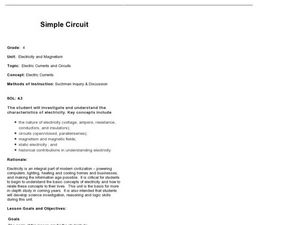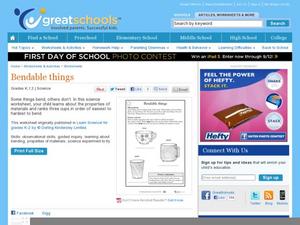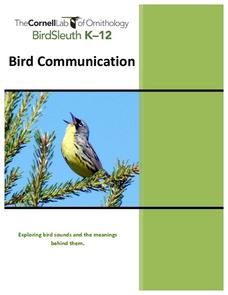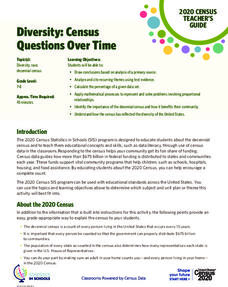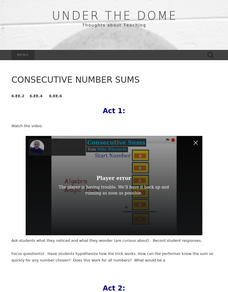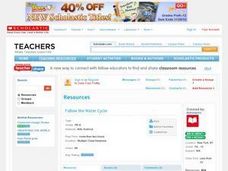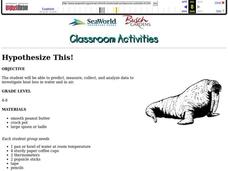Curated OER
Simple Circuit: Electric Currents and Circuits
Through inquiry and exploration, 4th graders will learn and understand the functions of open and closed circuits. They will break into 2 groups, define vocabulary, hypothesize how to light a bulb, then test their hypothesis 4 different...
Curated OER
Bendable Things
What kinds of cups can bend? Kindergartners find out with a straightforward science inquiry, designed to teach them about the properties of materials. They hypothesize about the flexibility of a china cup, a plastic cup, and a paper cup....
Alabama Learning Exchange
Bloodstain Pattern Doesn't Lie......
An interesting instructional activity on hypothesizing about the diameter of a drop of blood that is splattered. To test their theories, learners work in groups to make blood droplets splatter from different heights. They use graphed...
University of Wisconsin
Identifying Your Soil for Rain Gardens
Teach your class the descriptive characteristics of soil. Provide information about particle size and a flow chart for assessing texture. Soil scientists then analyze samples and hypothesize which would be the best type for a rain...
EngageNY
Justifying the Geometric Effect of Complex Multiplication
The 14th lesson in the unit has the class prove the nine general cases of the geometric representation of complex number multiplication. Class members determine the modulus of the product and hypothesize the relationship for the...
Balanced Assessment
Fit-Ness
Serve four towns with one bus route. Pupils develop a bus route that meets certain criteria to serve four towns. They determine which of the routes would best serve all of them. Individuals then hypothesize where a fifth town should be...
Messenger Education
Exploring Solar Systems Across the Universe
Scientists have theorized that our solar system formed 4.6 billion years ago. In this pair of activities, learners first hypothesize how our solar system was formed. Using this information, groups then determine how scientists search for...
Columbus City Schools
Sedimentary Rocks
Turn your class discussion of rock formation from ho-hum to holy hornfels! Junior geologists gain experience in identifying rock types and rock origins, with an emphasis in hypothesizing the environment needed to form certain rocks. The...
Cornell Lab of Ornithology
Bird Communication
Sing for your dinner! Investigate the purpose of bird songs and strategies birds use to communicate. Through the lessons, individuals learn how to recognize different types of bird communication as well as hypothesize the purpose of...
US Department of Commerce
Diversity: Census Questions Over Time
The story of race in the United States continues to evolve, and the numbers show it. Using data from the last two census counts, learners consider recent demographic shifts. They then analyze the information to hypothesize: What could...
Under the Dome
Consecutive Number Sums
Determine equivalent methods to find sums of consecutive numbers. Learners watch a video of a computer program that finds the sum of five consecutive numbers given a starting number. Pupils hypothesize how to determine the sum without...
Newseum
Before and After: Analyzing Turning Points in History
Scholars examine front-page news stories to gather evidence about significant historical events. They hypothesize how these events changed people's lives who lived through them and how they continue to impact lives today.
Curated OER
Follow the Water Cycle
Students explore the stages in the water cycle, evaporation, condensation, and precipitation. They hypothesize about the source of rain and search for forms of water on Earth.
Curated OER
Why did the can crush?
Students watch a demonstration to ascertain why a soda can crushed. They make observations and hypothesize about why a soda can crushed and relate the difference in pressure to its affect on objects around us (soda can). Explanation is...
Curated OER
HYPOTHESIZE THIS!
Students predict, measure, collect, and analyze data to investigate heat loss in water and in air.
Curated OER
Hypothesize This!
Students role play scientists to prove a hypotheses. They determine whether or not walruses stay warmer in water or in air. Students also determine in which environment they lose more body heat.
Curated OER
Using Imagery To Introduce the Endocrine System
Students listen with closed eyes to a story that starts in a relaxed tone and ends in a scream. They list the body reactions they experience: fast heart rate, shaking, etc. and hypothesize the reason for the reactions. They explore the...
Curated OER
Potential Consequences of Climate Variability and Change
Students examine the potential impact of climate change to agriculture, coastal areas, forests, water, and human health. They hypothesize what might happen to a sugar maple forest and hold a debate about global warming.
Curated OER
Big Rocks, Little Rocks
Students simulate the effects of erosion on rocks. Students smash cookies into smaller pieces to simulate how sandstone is created from larger rocks. Students hypothesize the types of things that could break up rocks and whether sand...
Curated OER
Marine Animals: Stranded on the Coast
Students identify marine animals that could become stranded due to coastal features and currents. They plot data on worksheets for locations of sea turtles actually beached or stranded. After plotting their points, they hypothesize...
Curated OER
Is Our Water Healthy?
Students test water for a least one chemical characteristic. They hypothesize how a storm event might change the chemical characteristics of a stream. Students collect water samples and use the chemical test to test the water.
Curated OER
Three is a Toxic Number
Future public health advocates read a case study of a combination of water pollutants that may be linked to autism. The class is split into three groups, one to research each of the suspected chemicals. The look at how each one affects...
Curated OER
Teach Peace Now
Help your learners discover empathy and understanding by investigating two sides of a situation. In this humanities lesson, pupils examine different pairs of shoes and hypothesize about who may have worn them. Discuss real life...
Curated OER
Multiple Perspectives
Analyze multiple perspectives in short stories. Sixth graders examine the point of view of each major character in three different short stories. After reading the stories, they role-play characters and hypothesize about the character's...


